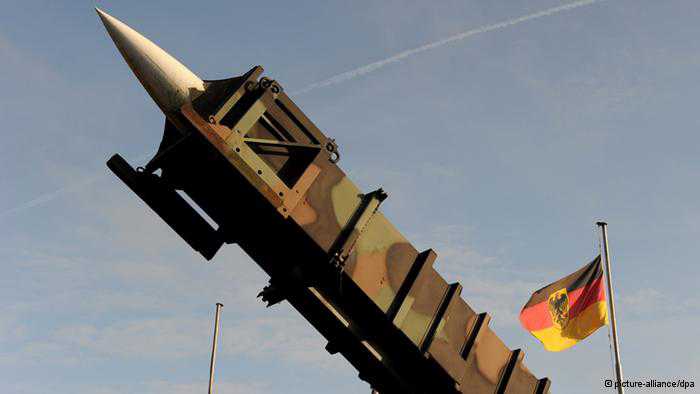The Patriot missile defense system is meant to protect Turkey, in case neighboring Syria launches an attack. But the area is too big for the existing missile defense shield – not all cities are covered.

At the beginning of February 2013, German, Dutch and US patriot missiles are expected to be set up in southeastern Turkey, facing skywards. The sophisticated weapon systems are to deter possible missile attacks by Syria towards NATO ally, Turkey. The Germans are stationed in Kahramanmaras, the Dutch in the Mediterranean city of Adana and US troops in Gaziantep. Major cities like Diyarbakir or Batman lie outside the protection zone. The six patriot missiles will not suffice to effectively protect the 900 kilometer (560 miles) border with Syria.
German Air Force spokesman Lieutenant Colonel Markus Werther stressed in an interview with DW that the decision regarding the German forces’ location had been made within NATO’s framework. There was close cooperation between all countries involved, he said.
“Together with our partners, the Netherlands, the USA and Turkey, Germany decided to go to Kahramanmaras,” Werther added. On January 8th, 2013, the German armed forces, the Bundeswehr, began shipping the missiles.
Turkish soldiers patrol in the Turkish town of Ceylanpinar near the strategic Syrian border town of Ras al-Ain on November 14, 2012. (Photo. BULENT KILIC/AFP/Getty Images) The situation on the Turkish-Syrian border has been tense for months
Patriot stationing a symbolic act
The missiles, with a range of 68 kilometers, are only able to protect a few cities in the south of the country. Michael Brtoska, Scientific Director of the Institute for Peace Research and Security Policy at the University of Hamburg, sees the missile defense as a largely symbolic act.
“The protection the missiles can theoretically offer against attacks from Syria is limited to small areas,” he explained.
Large population centers do come within the protective zone. But more extensive protection is not possible with existing resources, Brzoska added.
NATO patriot missiles have been stationed in Turkey before – during the Iraq wars in 1991 and 2003. When five people of Turkish nationality were killed in grenade attacks from the Syrian border in October 2012, Ankara called on NATO for support again. In early December 2012, the alliance gave its green light for the mission. Turkish media reported that Ankara had initially hoped for 18 to 20 systems along its southern border. But that would have meant that a considerable part of all existing patriot entities would have been deployed. Germany, the US and the Netherlands eventually offered to set up two systems each.
Impossible to monitor no-fly-area
Apart from threat analyses and logistical factors, the defensive character of the mission was a decisive factor when it came to choosing the location.
“Most NATO member states were extremely concerned that the patriot missiles could also be used to target planes in the Syrian airspace,” said Brzoska.
In early December, the German government stressed that the goal of the mission was not to set up or monitor a no-fly area above Syrian territory. NATO, which has the command for the mission, also confirmed the mission’s defensive character. Kahramanmaras and Adana are both 100 kilometers away from the border – too far to reach Syria. Similarly, if a US rocket was to be launched from Gaziantep, it would hardly reach Turkey’s neighbor in the south.
Under motorcycle escort at the break of dawn Dutch Patriot defence missiles are transported from their base to the Eems harbor in Groningen. (Photo: EPA/Evert-Jan Daniels pixel) Patriot missiles on their way to Turkey in early January
But the defense missiles can strengthen Turkish air raid defense systems.
“In the unlikely case of Syria attempting to enter Turkish airspace with planes or even intermediate-range missiles, Turkish air raids alone would hardly be in a position to prevent that from happening,” Brzoska explained.
Intermediate-range missiles in particular would overwhelm Turkish systems. The Syrian army has both intermediate-range missiles and chemical weapons. Neighboring countries are concerned that the government in Damascus could use these weapons as a last resort if threatened with defeat in the Syrian civil war.
Ready within seconds after missile attack
In the worst-case scenario, the patriot missiles could react instantly to approaching missiles, planes or drones. The airspace is monitored around the clock, said Lieutenant Colonel Werther. “In case of attack, which is still highly unlikely, the weapon system would stand ready for action within seconds,” he added.
Brzoska sees no reason for the government in Damascus to launch attacks on Turkey. Under the conditions of the current mandate, he said, the risk for German soldiers to be involved in combat action is low.
“Chances are very high that the soldiers are looking at a quiet time there,” Brzoska noted.
via NATO sets up missile defense shield in Turkey | World | DW.DE | 20.01.2013.

Leave a Reply